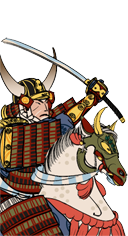
Basic Unit Statistics (can be modified by difficulty level, arts, skills, traits and retainers)
| Recruitment Cost | 1400 | |
| Upkeep Cost | 200 | |
| Melee Attack | 30 | 85% |
| Charge Bonus | 30 | 60% |
| Bonus vs Cavalry | 0 | 0% |
| Melee Defence | 10 | 28% |
| Armour | 8 | 53% |
| Morale | 40 | 80% |
Strengths & Weaknesses
- Excellent in melee.
- Slower than other cavalry.
- Excellent morale.
- Vulnerable to yari and naginata infantry.
- Vulnerable to matchlocks.
Abilities
- Second Wind - This restores a portion of nearby units' stamina, allowing them to fight longer and harder.
- Wedge Formation - Trained to charge in a wedge formation in order to better penetrate enemy formations
Requires
- Resources:

Description
These heavily-armoured men wield their blades with a brutal expertise.
Masters of steed and blade, these elite cavalry can deliver a powerful charge or fight on foot to mercilessly cut through their foes. Their intervention can be decisive: apart from spear-armed men, few foes can resist their assault and even fewer can match them in melee. While bowstrings snap, spears shatter and matchlocks cannot fire in the rain, the katana is always ready. In the hands of a disciplined and highly-trained horseman, the blade can be brought to bear with a force that can shatter the will, and skulls, of any enemies. The curved katana is well suited to cavalry use. It evolved from weapons used by the Emishi tribes of the late Nara and Heian periods. Used to cut down, it is far superior to any straight-bladed sword. Although usually regarded as a secondary weapon for cavalry troops, the katana was the soul of a samurai. This was epitomised at the battle of Kariwano, at the end of the Boshin War in 1868. The Shonai army were overwhelmed by the modern weaponry of their enemy and made a final heroic, if ultimately suicidal, charge towards their Imperial foes. At the end, every samurai drew his katana to die a good death.